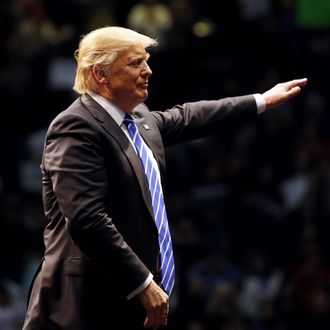
In the midst of Donald Trump’s grievance-filled Wall Street Journal op-ed today (nicely summarized by my colleague Eric Levitz) is this ingenious line, meant to set a new standard for legitimacy in the GOP presidential field:
Mr. Cruz has no democratic path to the nomination. He has been mathematically eliminated by the voters.
What that means is that Cruz can no longer secure a majority of voters on the first ballot. Only Donald Trump can, even though he very well might not. So this is a sort of “King of the Mountain” standard, whereby the last candidate who might theoretically win a first-ballot victory becomes the putative nominee by process of elimination. We might as well just cancel the rest of the primaries and get ready to crown The Donald in Cleveland.
But Trump’s isn’t the only campaign playing games with a distinctive definition of legitimacy. Team Cruz is sticking with Rule 40(b) as the be-all-and-end-all determining who can be considered, as evidenced by its frequent invocation of said rule to exclude John Kasich:
Morton Blackwell, a Cruz supporter who served on rules committees at the last seven national conventions, expects that this year’s convention will apply the rule to bar Kasich.
“Under the rules, it appears that Kasich can’t meet the eight-state threshold,” Blackwell told MSNBC.
“The rules were established by people who largely are for Kasich right now — the establishment — and changing the rules in the middle of the game is quite generally understood as unfair,” Blackwell added, previewing an argument against a rule that would list Kasich on the ballot.
That Rule 40(b) was only adopted in 2012 for the entirely different reason of protecting an actual nominee from noisy dissension seems to cut no ice. It’s eight states or out.
Kasich, as the above discussion indicates, would like to see only active primary-season candidates considered, but beyond that — hey, it’s anyone’s game and may the man with the best general-election polls win!
And then you have the Establishment’s “open convention” advocates, who maintain that if no one arrives in Cleveland with a first-ballot majority, anything and everyone is rightly on the table. Voters had their chance to choose a nominee and couldn’t get ‘er done, so the Party Should Decide without fear or favor.
Sources
Wall Street JournalIt’s a shame there’s no referee to sort out these arguments. If Reince Priebus tried, it would almost certainly be the last decision he made as RNC chairman.






























